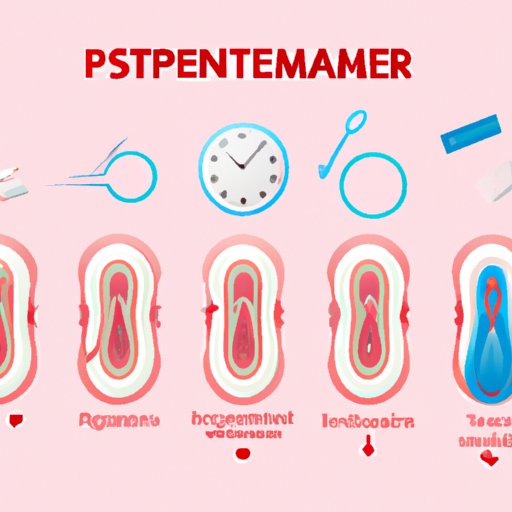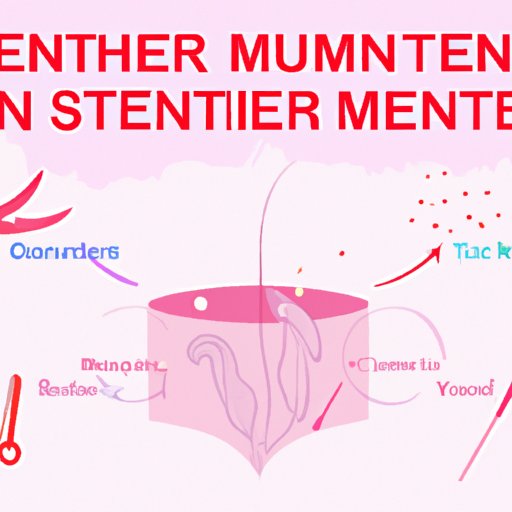
Introduction
For many people, the idea of getting pregnant right after their period seems far-fetched. However, the truth is that it is possible to conceive during this time, although less likely than during ovulation. Many of us have misconceptions about our menstrual cycles and the factors that can impact conception. In this article, we will explore some common myths about getting pregnant after your period and the role of ovulation in fertility.
Fact or Fiction: Getting Pregnant Right After Your Period
Contrary to popular belief, getting pregnant immediately after your period is possible. While it is less likely than during ovulation, it can still happen. Sperm can survive in the female reproductive system for up to five days, meaning that if you have sex towards the end of your period, there is a chance that sperm will be present when ovulation occurs.
However, it’s worth noting that the chances of pregnancy happening during this time are relatively low. According to the American Pregnancy Association, your fertility window typically occurs between the 11th and 21st day of your menstrual cycle, with ovulation happening around the 14th day for the average woman.
It’s essential to understand that every woman’s menstrual cycle is different, and there are several factors that can impact fertility, including age, hormonal imbalances, and underlying medical conditions.

The Science Behind Conception: Understanding Your Menstrual Cycle
Before diving further into the topic, it’s essential to understand the menstrual cycle. The menstrual cycle is a complex process that is regulated by different hormones, including estrogen, luteinizing hormone (LH), and follicle-stimulating hormone (FSH).
There are four phases in the menstrual cycle, including the menstrual phase, the follicular phase, ovulation, and the luteal phase. Each phase plays an essential role in fertility, with ovulation being the most crucial factor in determining your chances of getting pregnant.
The menstrual phase begins on the first day of your period and lasts for 3-7 days. Hormone levels are relatively low during this stage, and the uterus sheds its lining, which is then expelled as menstrual blood.
The follicular phase is when the body prepares for ovulation. Hormone levels begin to increase, and the ovaries develop follicles to release an egg.
Ovulation occurs when the ovary releases an egg, which then travels down the fallopian tube and towards the uterus. This is the most fertile period of the menstrual cycle.
The luteal phase is the stage after ovulation, where the ovaries produce progesterone to thicken the lining of the uterus. If conception does not occur, the lining is shed during the next menstrual cycle.
5 Myths About Pregnancy Immediately After Your Period
There are several misconceptions around getting pregnant after your period. Here are some of the most common myths:
Myth 1: You Can’t Get Pregnant During Your Period
While the chances of getting pregnant during your period are low, it is still possible. Sperm can live in the female reproductive system for up to five days, and if ovulation occurs shortly after your period, there is a chance that fertilization will happen.
Myth 2: You’re Only Fertile During Ovulation
Ovulation is the most fertile period of the menstrual cycle. However, there is a chance of getting pregnant during the follicular and luteal phases as sperm can survive in the female reproductive system for several days.
Myth 3: Birth Control Is Not Necessary After Your Period
It’s essential to continue using birth control after your period as there is still a chance of getting pregnant during this time. Plus, unprotected sex puts you at risk of contracting sexually transmitted infections (STIs).
Myth 4: Precum Can’t Get You Pregnant
Precum, also known as pre-ejaculate, can contain sperm and, as such, can cause pregnancy, albeit less likely than during ejaculation.
Myth 5: You Will Get Pregnant Immediately After Stopping Birth Control
It’s a common misconception that you will get pregnant soon after stopping birth control. The time it takes for fertility to return to normal varies for each woman and can take several months to a year.
The Importance of Tracking Ovulation for Effective Conception
Knowing when you ovulate is crucial if you’re trying to conceive. There are several methods of tracking ovulation, including:
- Basal body temperature
- Cervical mucus monitoring
- Ovulation predictor kits
- Saliva ovulation tests
By tracking your ovulation, you can maximize your chances of getting pregnant. Typically, the window of fertility lasts for six days, including the day of ovulation and the five days leading up to it. Having sex during this time improves your chances of conception.
Additionally, tracking your menstrual cycle can help identify any potential issues with ovulation or fertility, allowing you to seek medical assistance if needed.
The Role of Hormones in Your Fertility Window
Hormones play a crucial role in determining your fertility window. Estrogen and progesterone are hormones that regulate the menstrual cycle and impact fertility.
During the follicular phase, estrogen levels rise to thicken the lining of the uterus and promote ovulation. During ovulation, LH levels surge, triggering the release of an egg. After ovulation, progesterone levels rise to thicken the uterine lining and prepare it for implantation.
Understanding hormone levels and fluctuations is essential if you’re trying to conceive. Tracking your menstrual cycle allows you to identify any issues with hormone levels, such as irregular periods or hormonal imbalances, early on.
Maximizing Your Chances of Getting Pregnant: Tips for Trying to Conceive
While there is no guaranteed way of getting pregnant, several lifestyle changes and tips can improve your chances. Here are some tips for trying to conceive:
- Maintain a healthy weight
- Eat a healthy, balanced diet
- Exercise regularly
- Reduce stress levels
- Avoid smoking, alcohol and drugs
It’s also essential to ensure that both you and your partner are healthy and STD-free. STDs can impact your reproductive health, so it’s crucial to practice safe sex and get regular STD testing.
The Risks of Unprotected Sex After Your Period: STDs and More
Choosing to have unprotected sex after your period puts you at risk of unwanted pregnancy and sexually transmitted infections (STIs). Unprotected sex can also lead to bacterial vaginosis and other infections that can impact reproductive health.
It’s essential to practice safe sex and use contraception to prevent unwanted pregnancy. Additionally, getting tested regularly for STDs can protect your reproductive health and ensure that any infections are identified and treated early on.
Conclusion
Getting pregnant right after your period is possible, although less likely than during ovulation. Understanding your menstrual cycle, tracking ovulation, and staying healthy can all improve your chances of conceiving. Additionally, it’s essential to practice safe sex and seek medical assistance if needed to ensure reproductive health and wellbeing. Ultimately, taking proactive steps towards sexual and reproductive health can help you achieve your goals and live a fulfilling life.




